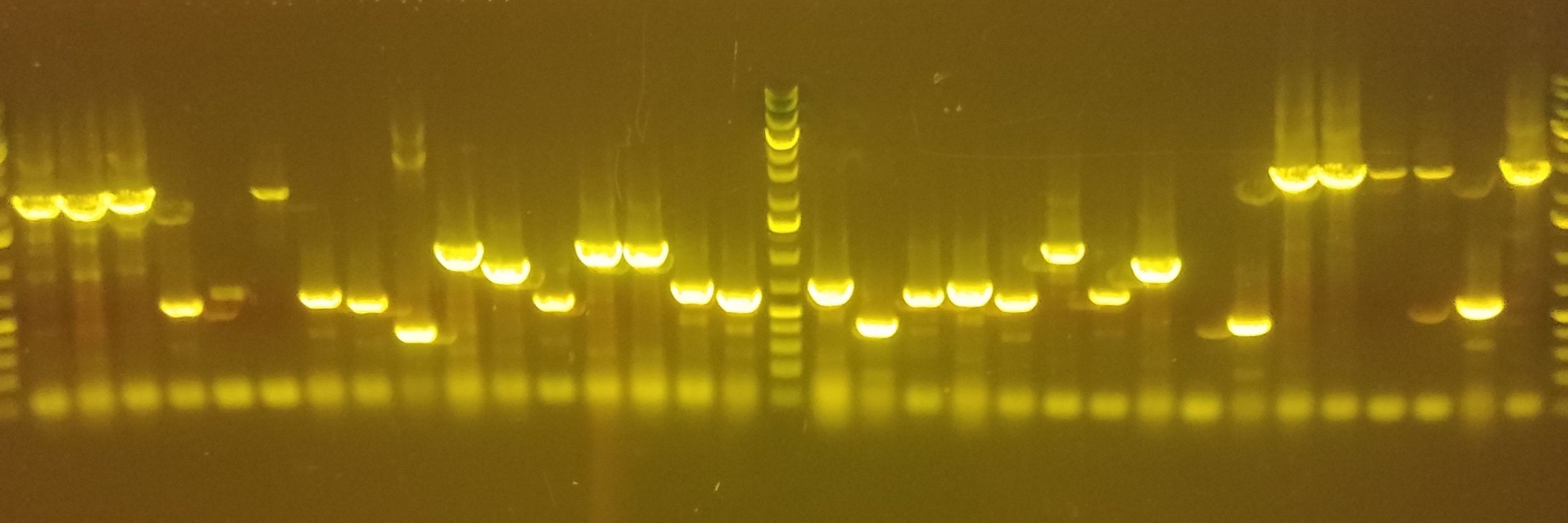
Aleksei Agapov
@alekseiagapov.bsky.social
postdoc at van Houte lab, University of Exeter
Reposted by Aleksei Agapov
New preprint!
Ever wondered why only a fraction of genomes encode CRISPR immunity? 🧬 🦠
Turns out CRISPR is rarely beneficial against virulent phages, being most beneficial against those for which resistance mutations are rare!
An epic effort by Rosanna Wright
www.biorxiv.org/content/10.1...
Ever wondered why only a fraction of genomes encode CRISPR immunity? 🧬 🦠
Turns out CRISPR is rarely beneficial against virulent phages, being most beneficial against those for which resistance mutations are rare!
An epic effort by Rosanna Wright
www.biorxiv.org/content/10.1...

Resistance mutation supply modulates the benefit of CRISPR immunity against virulent phages
Only a fraction of bacterial genomes encode CRISPR-Cas systems but the selective causes of this variation are unexplained. How naturally virulent bacteriophages (phages) select for CRISPR immunity has...
www.biorxiv.org
October 6, 2025 at 6:27 AM
New preprint!
Ever wondered why only a fraction of genomes encode CRISPR immunity? 🧬 🦠
Turns out CRISPR is rarely beneficial against virulent phages, being most beneficial against those for which resistance mutations are rare!
An epic effort by Rosanna Wright
www.biorxiv.org/content/10.1...
Ever wondered why only a fraction of genomes encode CRISPR immunity? 🧬 🦠
Turns out CRISPR is rarely beneficial against virulent phages, being most beneficial against those for which resistance mutations are rare!
An epic effort by Rosanna Wright
www.biorxiv.org/content/10.1...
Reposted by Aleksei Agapov
We're looking for a technician at Institut Pasteur for experimental work on satellite-phage-bacteria interactions, working directly with @jmouradesousa.bsky.social and myself in the lab of @epcrocha.bsky.social ! ANR funded.
Link to the job emploi.pasteur.fr/offre-de-emp...
Thx for sharing!
Link to the job emploi.pasteur.fr/offre-de-emp...
Thx for sharing!
INSTITUT PASTEUR - Technicien de recherche Microbiologie H/F
emploi.pasteur.fr
September 12, 2025 at 2:42 PM
We're looking for a technician at Institut Pasteur for experimental work on satellite-phage-bacteria interactions, working directly with @jmouradesousa.bsky.social and myself in the lab of @epcrocha.bsky.social ! ANR funded.
Link to the job emploi.pasteur.fr/offre-de-emp...
Thx for sharing!
Link to the job emploi.pasteur.fr/offre-de-emp...
Thx for sharing!
Reposted by Aleksei Agapov
I have an MRC-funded PhD project available (www.exeter.ac.uk/study/fundin...) on how warming will change the problem of AMR. Join a small and friendly group (padpadpadpad.netlify.app/about) in (sometimes) sunny Cornwall. 🧪🦠 #microsky
Please share the ad below with anyone who may be interested.
Please share the ad below with anyone who may be interested.

September 16, 2025 at 8:08 AM
I have an MRC-funded PhD project available (www.exeter.ac.uk/study/fundin...) on how warming will change the problem of AMR. Join a small and friendly group (padpadpadpad.netlify.app/about) in (sometimes) sunny Cornwall. 🧪🦠 #microsky
Please share the ad below with anyone who may be interested.
Please share the ad below with anyone who may be interested.
Reposted by Aleksei Agapov
Can CRISPR-Cas systems target any phage? Yes, no, it depends? What does it depend on? The second paper from my PhD came out today in a special issue of Phil Trans B on the ecology and evolution of bacterial immune systems
doi.org/10.1098/rstb...
doi.org/10.1098/rstb...

Phage susceptibility to a minimal, modular synthetic CRISPR-Cas system in Pseudomonas aeruginosa is nutrient dependent | Philosophical Transactions of the Royal Society B: Biological Sciences
CRISPR-Cas systems can provide adaptive, heritable immunity to their prokaryotic hosts
against invading genetic material such as phages. It is clear that the importance
of acquiring CRISPR-Cas immunit...
doi.org
September 4, 2025 at 11:32 AM
Can CRISPR-Cas systems target any phage? Yes, no, it depends? What does it depend on? The second paper from my PhD came out today in a special issue of Phil Trans B on the ecology and evolution of bacterial immune systems
doi.org/10.1098/rstb...
doi.org/10.1098/rstb...
Reposted by Aleksei Agapov
How do bacteria choose what type of defences to use against phages? We explored that question in the last paper I worked on as a postdoc at the Uni of Exeter @uniofexeteresi.bsky.social with Stineke van Houte, Stefano Pagliara and Edze Westra (not on Bluesky)
doi.org/10.1098/rstb...
doi.org/10.1098/rstb...

Phage provoke growth delays and SOS response induction despite CRISPR-Cas protection | Philosophical Transactions of the Royal Society B: Biological Sciences
Bacteria evolve resistance against their phage foes with a wide range of resistance
strategies whose costs and benefits depend on the level of protection they confer
and on the costs for maintainance....
doi.org
September 4, 2025 at 4:02 PM
How do bacteria choose what type of defences to use against phages? We explored that question in the last paper I worked on as a postdoc at the Uni of Exeter @uniofexeteresi.bsky.social with Stineke van Houte, Stefano Pagliara and Edze Westra (not on Bluesky)
doi.org/10.1098/rstb...
doi.org/10.1098/rstb...
Reposted by Aleksei Agapov
Ever wondered why some bacteria have multiple CRISPR-Cas systems? Our new study led by Leah Smith shows how type I CRISPR systems can promote the acquisition and retention of new spacers into a co-occuring type III system. www.sciencedirect.com/science/arti...

Type I CRISPR-Cas immunity primes type III spacer acquisition
CRISPR-Cas systems are diverse, with microbes harboring multiple classes and subtypes. Type I DNA-targeting and type III RNA-targeting systems often c…
www.sciencedirect.com
August 18, 2025 at 3:06 PM
Ever wondered why some bacteria have multiple CRISPR-Cas systems? Our new study led by Leah Smith shows how type I CRISPR systems can promote the acquisition and retention of new spacers into a co-occuring type III system. www.sciencedirect.com/science/arti...
Reposted by Aleksei Agapov
Expression level of anti-phage defence systems controls a trade-off between protection range and autoimmunity
By Nitzan Aframian and Avigdor Eldar.
www.nature.com/articles/s41...
By Nitzan Aframian and Avigdor Eldar.
www.nature.com/articles/s41...
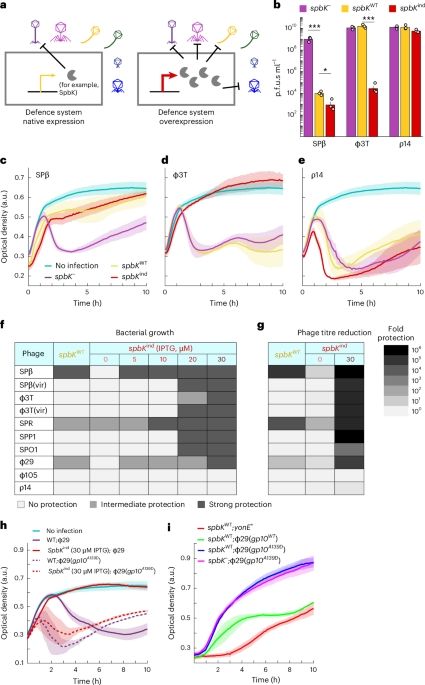
Expression level of anti-phage defence systems controls a trade-off between protection range and autoimmunity - Nature Microbiology
The authors examine several defense systems and find that increased expression enhances their protection range, albeit at a cost of autoimmunity.
www.nature.com
July 26, 2025 at 6:59 AM
Expression level of anti-phage defence systems controls a trade-off between protection range and autoimmunity
By Nitzan Aframian and Avigdor Eldar.
www.nature.com/articles/s41...
By Nitzan Aframian and Avigdor Eldar.
www.nature.com/articles/s41...
Reposted by Aleksei Agapov
Here we show how the type III signalling molecule SAM-AMP is bound and degraded by a specialised lyase enzyme encoded in cellular and phage genomes. More great work by @haotianchi.bsky.social and the team. @uniofstandrews.bsky.social
academic.oup.com/nar/article/...
academic.oup.com/nar/article/...
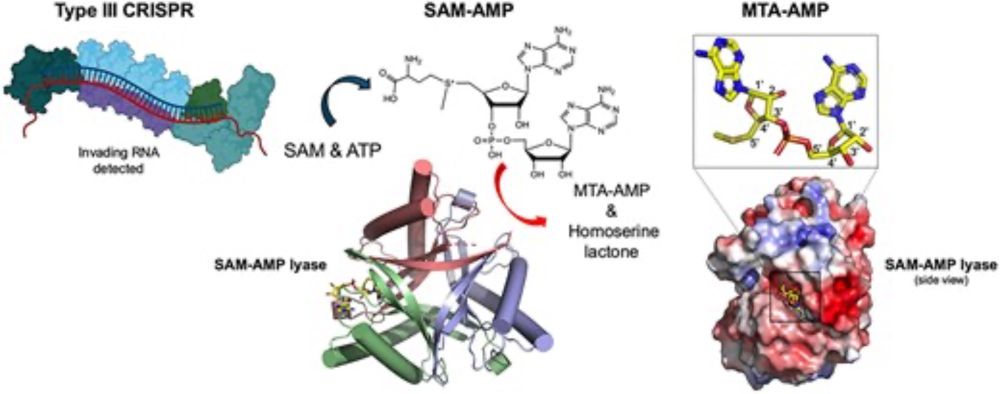
SAM-AMP lyases in type III CRISPR defence
Abstract. Type III CRISPR systems detect non-self RNA and activate the enzymatic Cas10 subunit, which generates nucleotide second messengers for activation
academic.oup.com
July 14, 2025 at 11:07 AM
Here we show how the type III signalling molecule SAM-AMP is bound and degraded by a specialised lyase enzyme encoded in cellular and phage genomes. More great work by @haotianchi.bsky.social and the team. @uniofstandrews.bsky.social
academic.oup.com/nar/article/...
academic.oup.com/nar/article/...
Reposted by Aleksei Agapov
We made structural predictions of representatives of each #PHROG from #phage genomes, and put the whole lot online. You can browse through montages or go to your favourite phrog directly and download its PDB.
💻🧬 #phagesky
linsalrob.github.io/PHROG_struct...
💻🧬 #phagesky
linsalrob.github.io/PHROG_struct...
PHROG Structure Gallery
linsalrob.github.io
July 7, 2025 at 8:28 AM
We made structural predictions of representatives of each #PHROG from #phage genomes, and put the whole lot online. You can browse through montages or go to your favourite phrog directly and download its PDB.
💻🧬 #phagesky
linsalrob.github.io/PHROG_struct...
💻🧬 #phagesky
linsalrob.github.io/PHROG_struct...
Reposted by Aleksei Agapov
How phages trigger antiphage defence systems is a big unknown in the field. Looks great!
#mevosky
#mevosky
July 3, 2025 at 7:09 AM
How phages trigger antiphage defence systems is a big unknown in the field. Looks great!
#mevosky
#mevosky
Reposted by Aleksei Agapov
Finally published! Many thanks to the reviewers and editor whose comments & suggestions improved this work significantly more than the first preprint version!!!
www.pnas.org/doi/10.1073/...
www.pnas.org/doi/10.1073/...
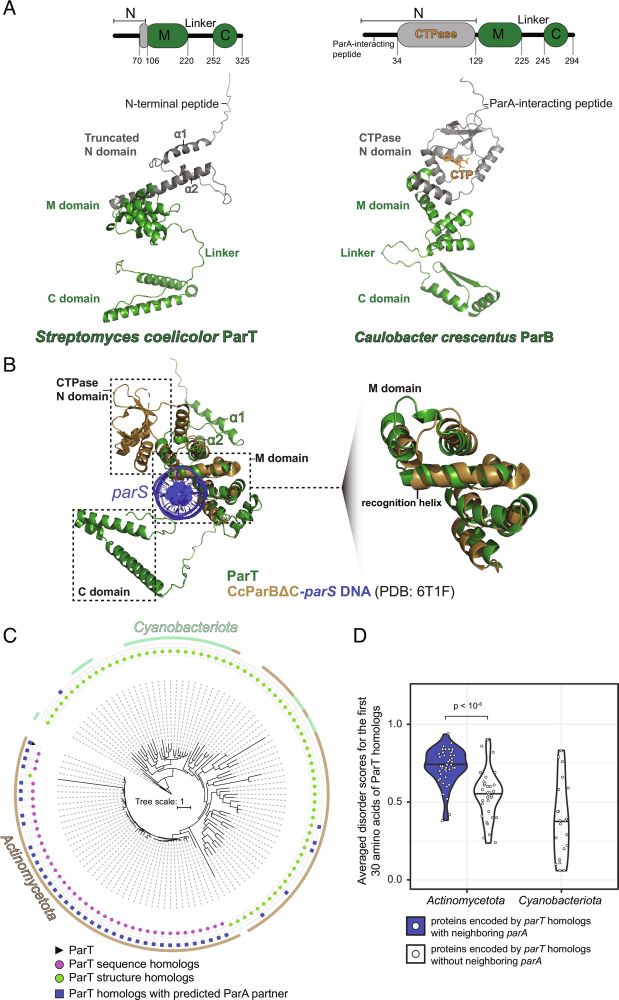
Expanding the diversity of bacterial DNA partitioning: A CTP-independent ParABS system for plasmid partitioning in Streptomyces | PNAS
The ATP- and CTP-dependent ParA-ParB-parS segrosome is a macromolecular complex that
segregates chromosomes/plasmids in most bacterial species. CTP...
www.pnas.org
July 2, 2025 at 5:49 PM
Finally published! Many thanks to the reviewers and editor whose comments & suggestions improved this work significantly more than the first preprint version!!!
www.pnas.org/doi/10.1073/...
www.pnas.org/doi/10.1073/...
Reposted by Aleksei Agapov
Phage DNA modifications evade defense
Phage DNA modification adds arabinose to cytosines via hydroxy linkage (5ara-hC) w/ potential double & triple arabinosylation. Arabinosylated phages are protected from DNA-targeting CRISPR-Cas & restriction modification
www.cell.com/cell-host-mi...
Phage DNA modification adds arabinose to cytosines via hydroxy linkage (5ara-hC) w/ potential double & triple arabinosylation. Arabinosylated phages are protected from DNA-targeting CRISPR-Cas & restriction modification
www.cell.com/cell-host-mi...
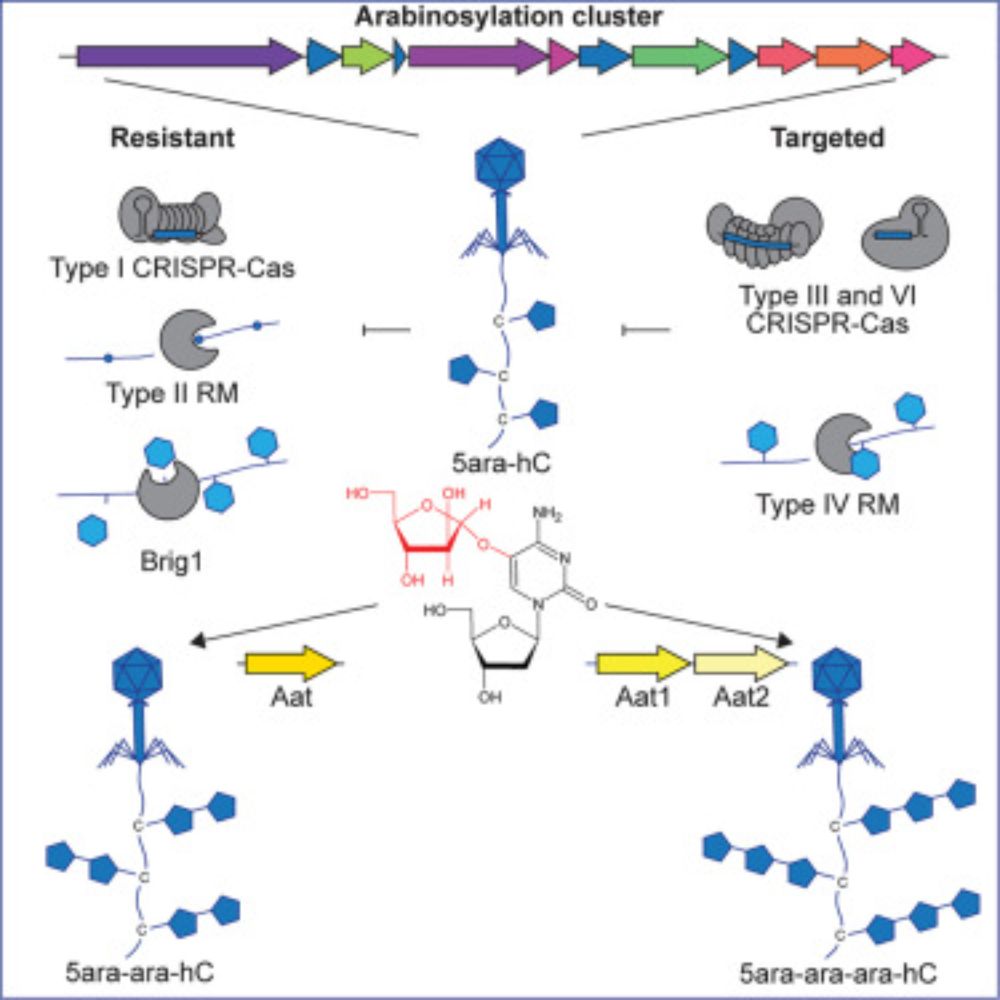
Phage arabinosyl-hydroxy-cytosine DNA modifications result in distinct evasion and sensitivity responses to phage defense systems
Mahler et al. describe a phage DNA modification that adds arabinose to cytosines via
a hydroxy linkage. This 5ara-hC modification can be further modified to double and
triple arabinosylation by phage-...
www.cell.com
June 26, 2025 at 8:38 PM
Phage DNA modifications evade defense
Phage DNA modification adds arabinose to cytosines via hydroxy linkage (5ara-hC) w/ potential double & triple arabinosylation. Arabinosylated phages are protected from DNA-targeting CRISPR-Cas & restriction modification
www.cell.com/cell-host-mi...
Phage DNA modification adds arabinose to cytosines via hydroxy linkage (5ara-hC) w/ potential double & triple arabinosylation. Arabinosylated phages are protected from DNA-targeting CRISPR-Cas & restriction modification
www.cell.com/cell-host-mi...
Reposted by Aleksei Agapov
. @emgoodall.bsky.social presenting her cool new transposon-based method on discovery of novel small proteins #EESMicrobiology
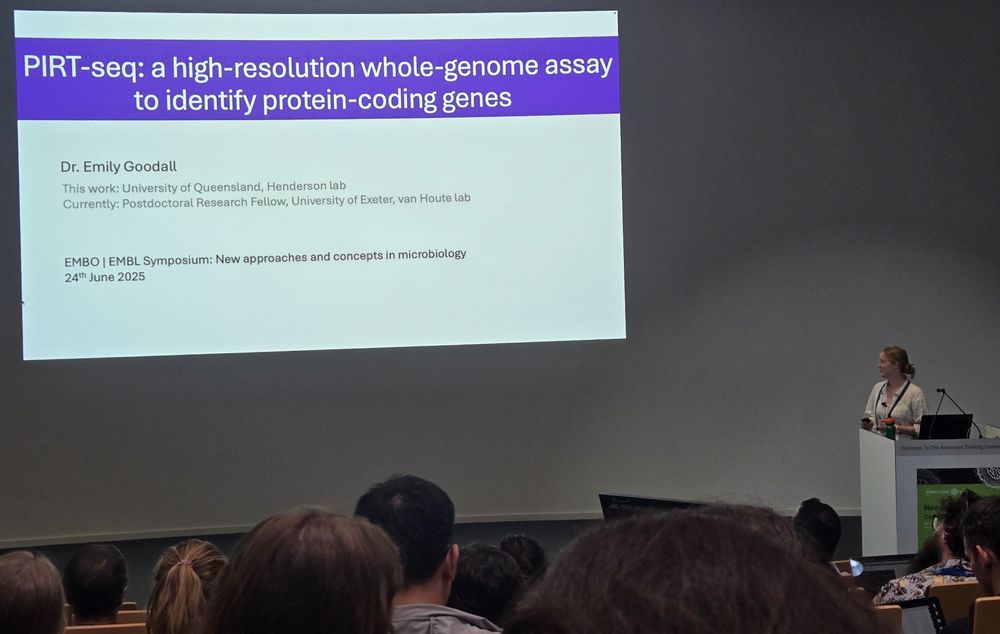
June 24, 2025 at 1:31 PM
. @emgoodall.bsky.social presenting her cool new transposon-based method on discovery of novel small proteins #EESMicrobiology
Presenting a poster about Pseudomonas defence systems at #EESMicrobiology in Heidelberg. If you happen to like it, don't forget to check out our consortium @multidefence.bsky.social

June 24, 2025 at 12:33 PM
Presenting a poster about Pseudomonas defence systems at #EESMicrobiology in Heidelberg. If you happen to like it, don't forget to check out our consortium @multidefence.bsky.social
Reposted by Aleksei Agapov
Happily representing @multidefence.bsky.social at the #EESMicrobiology in Heidelberg!
Come to my poster if interested in prophage-mediated phage defence!
Also don't miss @emgoodall.bsky.social's talk today, and @alekseiagapov.bsky.social and @davvi36.bsky.social posters!
Come to my poster if interested in prophage-mediated phage defence!
Also don't miss @emgoodall.bsky.social's talk today, and @alekseiagapov.bsky.social and @davvi36.bsky.social posters!
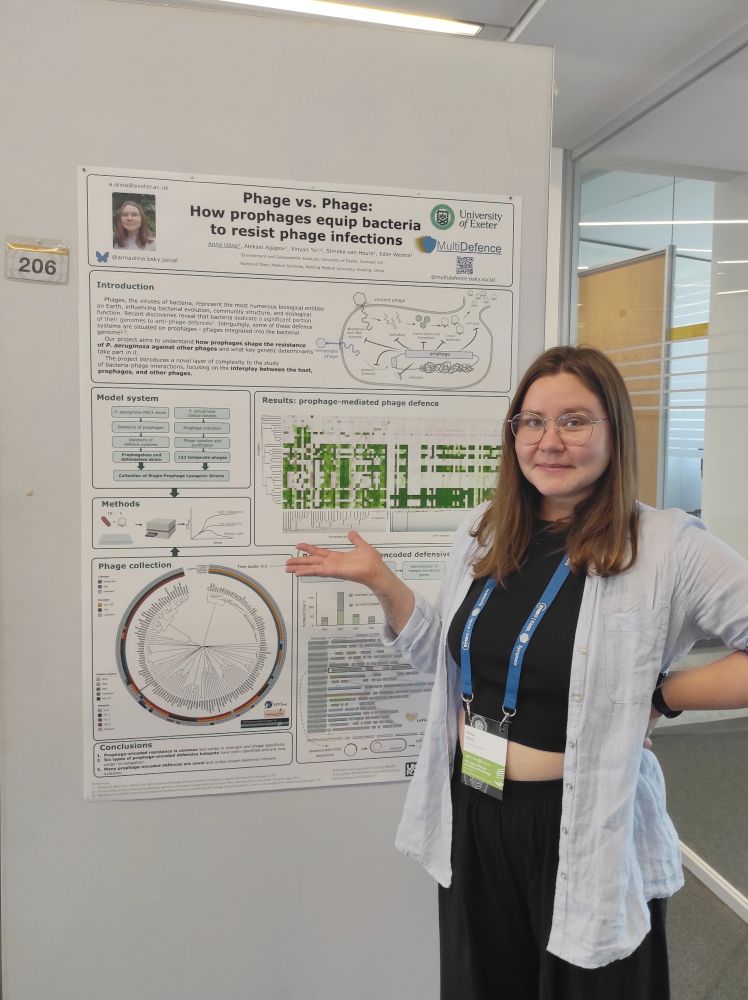
June 24, 2025 at 11:59 AM
Happily representing @multidefence.bsky.social at the #EESMicrobiology in Heidelberg!
Come to my poster if interested in prophage-mediated phage defence!
Also don't miss @emgoodall.bsky.social's talk today, and @alekseiagapov.bsky.social and @davvi36.bsky.social posters!
Come to my poster if interested in prophage-mediated phage defence!
Also don't miss @emgoodall.bsky.social's talk today, and @alekseiagapov.bsky.social and @davvi36.bsky.social posters!
Reposted by Aleksei Agapov
Made it to Heidelberg for #EESMicrobiology @events.embl.org!
Find me at poster 240 and make to check out @annaolina.bsky.social & @alekseiagapov.bsky.social 's posters and @emgoodall.bsky.social 's talk to see everyone from the lab 😁
Find me at poster 240 and make to check out @annaolina.bsky.social & @alekseiagapov.bsky.social 's posters and @emgoodall.bsky.social 's talk to see everyone from the lab 😁
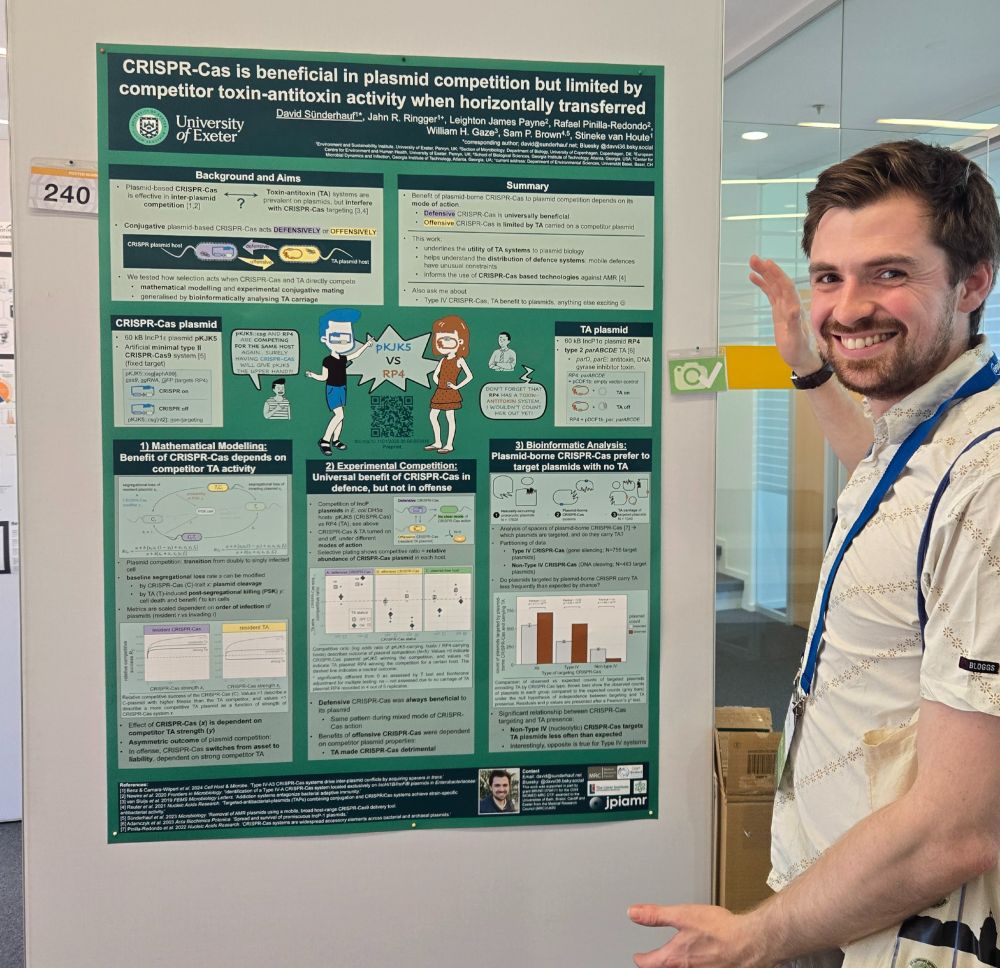
June 24, 2025 at 11:25 AM
Made it to Heidelberg for #EESMicrobiology @events.embl.org!
Find me at poster 240 and make to check out @annaolina.bsky.social & @alekseiagapov.bsky.social 's posters and @emgoodall.bsky.social 's talk to see everyone from the lab 😁
Find me at poster 240 and make to check out @annaolina.bsky.social & @alekseiagapov.bsky.social 's posters and @emgoodall.bsky.social 's talk to see everyone from the lab 😁
That was fun!
Great to get together in Manchester last week for our consortium’s annual meeting – halfway through our 5-year collaboration! Inspiring discussions, exciting updates, and lots of ideas ahead. Excited for what’s next! 💡🔬🤝 #Science #Microbiology #TeamScience

June 21, 2025 at 10:31 AM
That was fun!
Reposted by Aleksei Agapov
🚨 Reminder! You have just over two weeks to submit an abstract, if you want to present at the @microbiologysociety.org meeting "Understanding and predicting microbial evolutionary dynamics" in Liverpool in November! #microsky 🦠🧫🔬
‼️Update! Abstract submission is now open for the 2025 Liverpool UK @microbiologysociety.org meeting on "Understanding and predicting microbial evolutionary dynamics”! Deadline July 7th #microsky 🧪🧫🦠 microbiologysociety.org/event/societ...
June 20, 2025 at 2:35 PM
🚨 Reminder! You have just over two weeks to submit an abstract, if you want to present at the @microbiologysociety.org meeting "Understanding and predicting microbial evolutionary dynamics" in Liverpool in November! #microsky 🦠🧫🔬
Reposted by Aleksei Agapov
News from the world of pAgos:
We explored a distinct clade of short pAgos associated with HNH nuclease partners, which we named SPARHA, and discovered that they protect bacteria from phages and plasmids via abortive infection. Upon activation, SPARHA oligomerizes, forming filaments.
A long 🧵
We explored a distinct clade of short pAgos associated with HNH nuclease partners, which we named SPARHA, and discovered that they protect bacteria from phages and plasmids via abortive infection. Upon activation, SPARHA oligomerizes, forming filaments.
A long 🧵
April 7, 2025 at 1:03 PM
News from the world of pAgos:
We explored a distinct clade of short pAgos associated with HNH nuclease partners, which we named SPARHA, and discovered that they protect bacteria from phages and plasmids via abortive infection. Upon activation, SPARHA oligomerizes, forming filaments.
A long 🧵
We explored a distinct clade of short pAgos associated with HNH nuclease partners, which we named SPARHA, and discovered that they protect bacteria from phages and plasmids via abortive infection. Upon activation, SPARHA oligomerizes, forming filaments.
A long 🧵
Reposted by Aleksei Agapov
Had a great time today at #ESCMIDGlobal presenting on using CRISPR-Cas9 to kill E. coli ST131 and the emergence of different escape populations. Big thanks to @escmid.bsky.social and everyone who came by!


April 13, 2025 at 6:14 PM
Had a great time today at #ESCMIDGlobal presenting on using CRISPR-Cas9 to kill E. coli ST131 and the emergence of different escape populations. Big thanks to @escmid.bsky.social and everyone who came by!
Reposted by Aleksei Agapov
Is the genome just a bag of genes? A new paper in Science now reports that for two thirds of an organisms' genes the position along the chromosome is actually very tightly constrained! Amazing work from my favorite night scientist
Martin Lercher and his team!
www.science.org/doi/10.1126/...
Martin Lercher and his team!
www.science.org/doi/10.1126/...

April 11, 2025 at 5:56 PM
Is the genome just a bag of genes? A new paper in Science now reports that for two thirds of an organisms' genes the position along the chromosome is actually very tightly constrained! Amazing work from my favorite night scientist
Martin Lercher and his team!
www.science.org/doi/10.1126/...
Martin Lercher and his team!
www.science.org/doi/10.1126/...
Reposted by Aleksei Agapov
🔬 Three fronts in bacterial defense!
At EMBO symposium this week in Paris, our PIs showcased:
• @mfwhite2.bsky.social: cyclic nucleotide defence signaling
• Prof. Stineke Van Houte: prophage warfare in P. aeruginosa
• Prof. Tim Blower: autoregulating toxins & phage defence
At EMBO symposium this week in Paris, our PIs showcased:
• @mfwhite2.bsky.social: cyclic nucleotide defence signaling
• Prof. Stineke Van Houte: prophage warfare in P. aeruginosa
• Prof. Tim Blower: autoregulating toxins & phage defence



April 10, 2025 at 8:52 AM
🔬 Three fronts in bacterial defense!
At EMBO symposium this week in Paris, our PIs showcased:
• @mfwhite2.bsky.social: cyclic nucleotide defence signaling
• Prof. Stineke Van Houte: prophage warfare in P. aeruginosa
• Prof. Tim Blower: autoregulating toxins & phage defence
At EMBO symposium this week in Paris, our PIs showcased:
• @mfwhite2.bsky.social: cyclic nucleotide defence signaling
• Prof. Stineke Van Houte: prophage warfare in P. aeruginosa
• Prof. Tim Blower: autoregulating toxins & phage defence
Finishing the Microbial Warfare session strong!

April 3, 2025 at 11:16 AM
Finishing the Microbial Warfare session strong!
Phage vs Phage from @annaolina.bsky.social at #Microbio25. Fantastic talk!

April 2, 2025 at 3:09 PM
Phage vs Phage from @annaolina.bsky.social at #Microbio25. Fantastic talk!
Reposted by Aleksei Agapov
We also have a couple of poster presentations today 255 from @drramabht.bsky.social, 282 from @anna-k-richmond.bsky.social, 062 from Meg Llewellyn and 068 from Jasmine Thomas-Campbell. All cool stuff about defence systems!
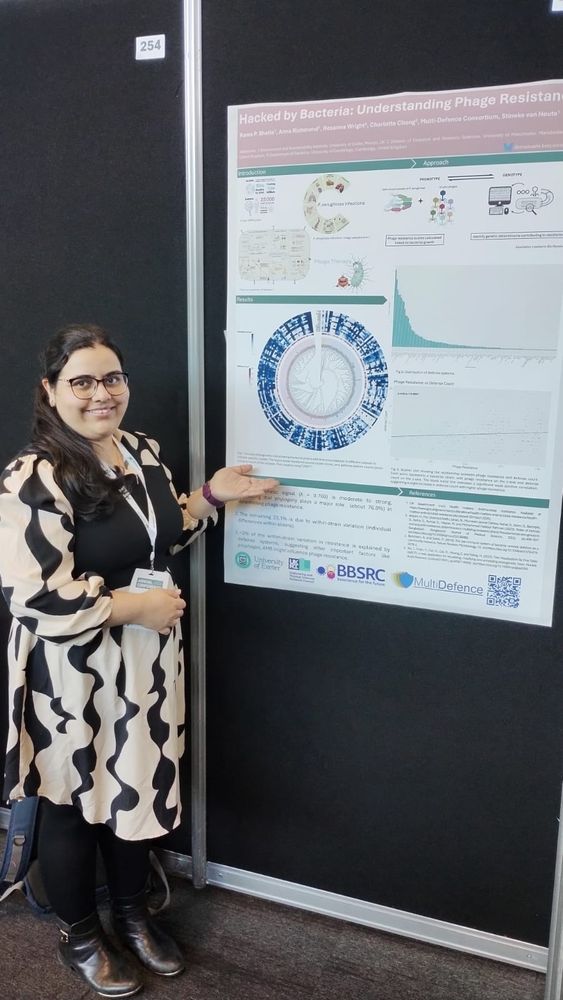
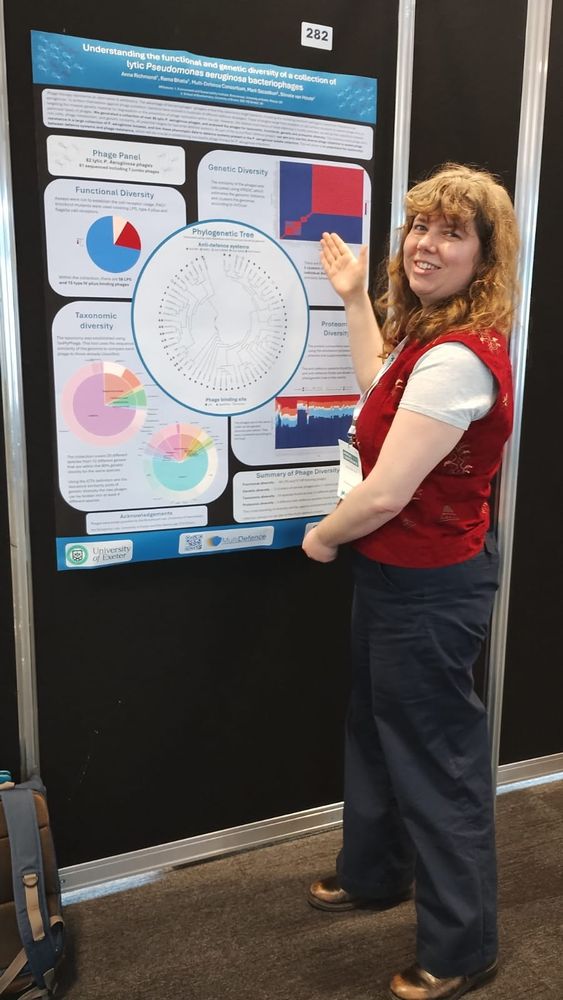
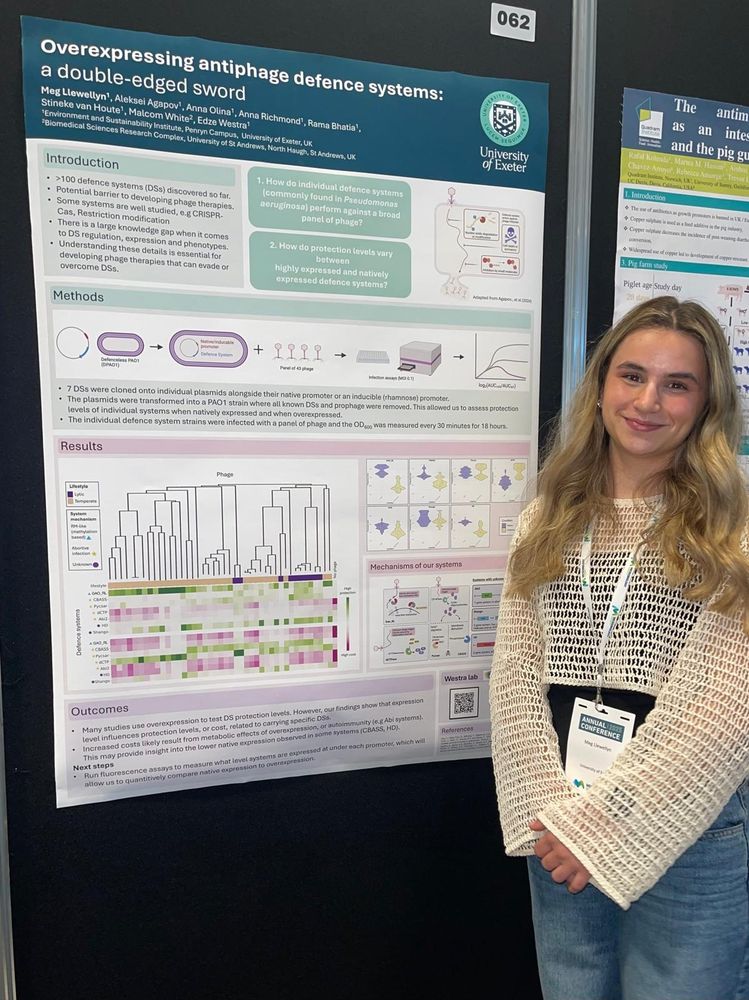
April 2, 2025 at 12:34 PM
We also have a couple of poster presentations today 255 from @drramabht.bsky.social, 282 from @anna-k-richmond.bsky.social, 062 from Meg Llewellyn and 068 from Jasmine Thomas-Campbell. All cool stuff about defence systems!


